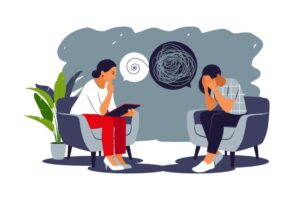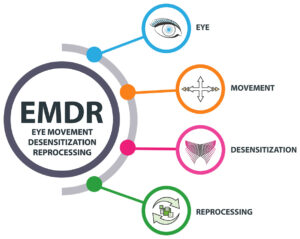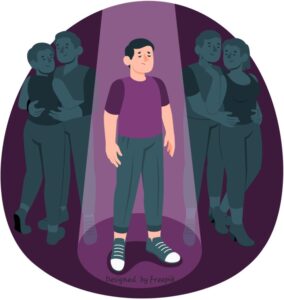CBT-I is the acronym used for Cognitive Behavioral Therapy for Insomnia. This therapy helps an individual overcome the stress experienced over not being able to fall asleep or not feeling adequately rested perhaps.
This stirs up multiple issues that can get in the way of one’s routine like growing grumpy the next morning inevitably impacting all facets of life like poor efficiency at work, not maintaining optimal harmony with family and friends, disruptions in keeping up highlighting loss of general focus and so on.
This sounds simple but over time, clamps up to become hazardous leading to physical and mental health troubles in the long run.
The technical mechanisms of CBT-I sleep therapy
Debunking the actual modality to understand the details of how this is applied is essential to further examine its benefits for those with insomnia.
CBT-I sleep therapy collaborates with several psychological entities of an individual to improve one’s sleep schedule and natural body clock in a way. This is as follows:
- Cognitive alterations: This includes delicate and subtle tweaks for the individual to switch from the unhelpful thought patterns one holds about sleep to realistic thoughts that eventually brings in a change. This is a covert change, something that cannot be measured but rather evaluated by gaining feedback from the individual suffering insomnia.
- Behavior modification: This ultimately is the end goal where the insomniac individual is able to navigate through the unhealthy patterns of their sleep schedules and establish a healthy behavior towards sleep by going to bed early and feeling rested. This consists of various intricate techniques like controlling stimulus before bed such as the use of smartphones, actively implementing sleep restrictions and lastly applying relaxation techniques on the individual to slowly and steadily improve their sleeping habits.
- Psychoeducational phase: This is often an underrated phenomena but helps tremendously as it elevates an individual’s self understanding to reach a space where one is able to come to terms with what is exactly wrong and how it can be fixed. This acknowledgement serves as a key factor in being able to elucidate and reflect on the mishaps that may have occurred mostly subconsciously.
CBT-I Sleep therapy: The Cognitive component
Everything begins with the mind, thoughts are the initial drivers for any given physical and mental hindrances where they act as either the perpetuating factors of a resulting condition or the consequences themselves.
This is a vicious loop that one can get trapped in, holding dysfunctional thoughts and beliefs that over time grow frequent and intensely affecting the actual behavior, sleep in this case.
Moving forward, these thoughts show up again endlessly as an association is drawn between the negative thoughts and behaviors becoming a pattern now which then reinforces the whole cycle more and more effortlessly over time.
CBT-I Sleep therapy: The Behavioral component
This is the most frustrating part which is also the hardest to resolve. This is because the unhelpful metaphorical assumptions of not being able to fall asleep now translates into unpleasant behaviors in reality which is actually failing to fall asleep.
There are many worthy, notable and scientifically proven techniques for the same which include the following:
- Controlling stimulus: This method in CBT-I sleep therapy is the correctional part of the entire therapy modality wherein action is taken upon the pre-sleep habits that usually tend to disintegrate the latter almost always. This can include the use of any gadget right before sleeping in the bedroom. This implies the space of sleep being occupied for multiple uses and that habituates one’s brain into thinking that bed is not meant just for sleeping but also for other activities like eating or scrolling mindlessly through the phone. This association strengthens and hence, implies more difficulty falling asleep. Therefore, removing these associations will gradually help improve one’s sleep quality.
- Restriction of sleep: This is a more realistic approach towards improving sleep quality in CBT-I sleep therapy wherein the ideal perception of sleep is reduced to what happens in reality to stick to that at least, setting bare minimum in other words. For instance, if one hopes to get 7 hours of sleep but only gets 4. This can be tackled by redefining the ideal by keeping the target achievable. This will mean getting started with 4 hours and 30 minutes of sleep first and if this is achieved, then the goal is gradually increased to 5 hours and so on.
- Relaxation techniques: These can do wonders when executed effectively. There are several techniques under this like certain breathing exercises, self hypnosis and meditation which are taught by a trained professional.
CBT-I Sleep therapy: The need for Psychoeducation
A solid and concrete part of CBT-I sleep therapy is educating the clients with the benefits of having a decent sleep hygiene as it elevates the overall well-being of an individual. These facts are more systematically showcased to the clients, so they are fed with insights that will create a pathway towards putting in more conscious efforts in enhancing their sleep schedules along the way.
Therefore, sleep is an extremely essential part of an individual’s quality of life as it gravitates and influences very many facets of life.
Why CoachForMind?
- Experienced Psychologists: We are a team of licensed RCI-registered clinical psychologists. Our team is well-experienced in various forms of therapy such as CBT, DBT, Narrative Therapy, and other therapeutic techniques such as CBT-I used for sleep therapy.
- Personalized Approach: We are dedicated to treating our clients in the best-suited way, carefully curated as per the client’s needs, and adhering to one-on-one, client-centered therapy.
- Scientific Techniques: Our treatment plans and therapeutic methods are based on highly researched scientific findings such as CBT, DBT, and Narrative Therapy among many other therapeutic techniques used in art therapy counselling.
- Quality service: We at CoachForMind ensure quality services in our treatment regime and therapeutic approaches. Our clients hold most value to us, so we ground our techniques in empathy while maintaining professionalism.
For more information, please visit our website or contact us directly at coachformind@gmail.com








